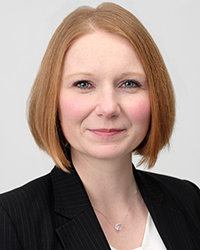

- Andrew Smith
- Vice President, Wholesale Payments, J.P. Morgan

- Eleanor Hill
- Editorial Consultant, Treasury Management International (TMI)
From enlisting in the Australian Army straight out of high school, to now being Vice President in the Wholesale Payments group at J.P. Morgan, via offshore oil and gas drilling, Andrew Smith’s career trajectory has given him diverse and valuable insights to deploy in banking. Here, he speaks to Eleanor Hill about his career and highlights the potential that he believes veterans can offer financial services functions.
Eleanor Hill, Editor, TMI (EH): Andrew, give me a potted history of your career to this point.
Andrew Smith (AS): I grew up in Australia and when I finished high school enlisted into the army initially as a rifleman in the infantry. In the military, you do language aptitude testing and I scored highly on that so I was reallocated to signals intelligence. I went to the Australian Signals Directorate, Australia’s equivalent of the NSA [National Security Agency] in the US or GCHQ [Government Communications Headquarters] in the UK. I spent a few years there as an analyst.
EH: That sounds exciting!
AS: It certainly had its moments, but equally there were many times where I spent 12 hours listening to static. After a few years I moved to Australia’s Land Electronic Warfare Unit, which is similar but involves being deployed tactically. While part of this unit I spent nine months in East Timor, an island just to the north of Australia, on peacekeeping operations. I worked as an interpreter, with doctors and other medical groups, doing Red Cross-type work.
After that, I wanted to shake things up a bit and move my career in a different direction. In 2010 I completed the Special Air Service [SAS] selection course and then spent my last five full-time years in the army with the SAS in Australia.
EH: What did you do after those five years were up?
AS: I finished on a Friday with the army toward the end of 2014, and then started on the following Monday with Schlumberger, the oilfield services company. I worked in drilling and measurements and supported directional drilling for many high temperature, high pressure offshore wells.
It sounds like an odd transfer, but my job in the army was actually quite quantitative, coming from signals intelligence. I’m quite comfortable with numbers, geometry and trigonometry. That also applied quite well to directional drilling in the oil fields. But I timed the move pretty poorly, because right around about 2014-15, oil prices pretty much collapsed. I remember in 2015, someone exclaimed over the loudspeaker: “A barrel of oil is now worth less than a bucket of KFC.”
I did that for a couple of years but with a family, flying offshore for four weeks at a time and flying home for one week was quite tough. That was when I realised I wanted a change.
EH: How did you approach making that change?
AS: I applied for a couple of different MBA programmes globally, and got a full scholarship at Cranfield University in the UK, which covered my tuition, my family’s flights and our accommodation for a year. At the end of that, I graduated my MBA with the Odgers Prize for overall achievement, which led to my role at J.P. Morgan. I had a few good opportunities throughout the MBA, both in consulting and in industry, but it was this role with J.P. Morgan that really piqued my interest because it’s similar to consulting but doing so internally for the business.
EH: What skills did you develop from being in the military?
AS: First and foremost, it is the relationship-building skills or the stakeholder- management skills. In some ways, the military is no different to any other organisation – you treat people well whether they are your manager, junior or peer. You’re always going to get more out of people if you influence rather than order. The army is a big team and usually operates very effectively on that basis. Bringing that kind of mentality with me into J.P. Morgan, and into my role, has really helped.
Something else we did in the military, whenever we planned anything – from a three-hour patrol through to a multi-year strategic operation – as part of that planning process we always considered all the possible points of failure, what the worst-case scenario could be and how we would cope with that. The approach that we had to planning and problem solving is something else I brought with me. When looking at a programme of work, while I’m an optimist by nature, I do assess my projects in a very pessimistic way so I can get ahead of any problems before they occur.
Finally, I think people from the military, myself included, bring a certain amount of determination and resilience. Tenacity is another quality I’ve brought into my role.
EH: You’ve also completed your ACT qualifications, haven’t you?
AS: Yes, I’ve got the Advanced Diploma in Treasury Management, so I am now a Fellow of the ACT (FCT). You have up to four or five years to do your assessments as and when you want to, but I treated it like ripping off a Band-Aid – just get into it and get it done. I spent pretty much every weekend and evening working on it last year, but I’m glad I did it that way.
EH: Tell me a little bit about the transition – how difficult was it to transition out of the military into a more ‘traditional’ role?
AS: In moving between industries there are always going to be some challenges. It could be technical, cultural, or organisational. One thing that makes banking particularly challenging is it’s pretty hard to picture what it entails when you’re on the outside. Initially, I was slightly daunted by that, but then I realised the whole bank is really an interconnected set of processes – a big gearbox of things that interact with each other. My approach has been to learn it bit by bit. Over the years – combined with doing the FCT – I’ve built a fairly holistic and broad understanding of what goes on across the bank.
EH: What is your advice for other veterans that are looking to move into a new kind of role as you have done?
AS: I’m one of two co-chairs of the Europe, Middle East and Africa Veterans Affinity Group, internally named ‘VETS’ within J.P. Morgan, so I’m passionate about this topic. What we suggest to people from the military wanting to make this or indeed any transition, not just into banking, is to try to identify early on what they want to do outside of the military. That doesn’t mean knowing a specific role on day one, but we encourage service leavers to do a lot of research and drill down into the fields where they might add value. It means they naturally interview a lot better.
I’d also encourage them to build a network and to start reaching out to people. I think veterans underestimate the extent to which people are willing to give their time to candidates they’ve never met before. I’ve had people from the military reach out to me, and obviously there’s a military connection there, but I’ll refer them to other non-military people in the bank who are always very happy to have an introductory conversation. Maybe it’s part of the military mindset, but I see sometimes service leavers are very hesitant to do that type of networking.
Finally, I’d say veterans should have a look at what kind of qualifications – even junior, entry-level qualifications – they can do in a new industry. That does two things. First, it helps them understand the context to a job. Secondly, it sends a message to the hiring manager – it’s a show of intent.
EH: What support is there in place at J.P. Morgan for veterans joining the bank?
AS: We have two key veterans’ programmes. There’s the Military Transition Programme, which is a six-month initiative. It provides orientation training, formal mentoring and upskilling. Over the last decade, in EMEA we’ve seen the programme grow from an initial intake of six to over 50 colleagues joining the firm this way in 2021. We still count it as a success if these candidates go on to another bank or a consultancy, because our job is to help them transition into the right role. The other programme is the Military Pathways Programme, where candidates come in at associate level and have the opportunity to complete two or three rotations within one of our lines of business.
At the bank we have the Military Veteran Affairs organisation, which has the remit of bringing military talent into the firm. Once they’re in the bank, the VETS group looks after them with support such as networking and mentoring, and we run all sorts of speaker events.
EH: What could companies do to better support veterans? Is there anything that treasurers specifically can do within their own departments?
AS: Something else I’m very passionate about is hiring for potential. I think of it as tactical versus strategic. Hiring someone from a veteran background who might not have the years of experience does take a bit more commitment – there might be slightly more investment required from a hiring manager initially, or there might be a slightly longer learning curve in the adaptation period. But if you look through the short-term J-curve in performance, I’ve seen more than enough evidence that, when supported and given a challenge within a bank, veterans can really succeed. It is about looking at the building blocks they have and the potential for outstanding performance, rather than what they can do on day one.
In my case, I was hired into a VP role without a banking background. My management saw the potential from the work I’d done in the past and how I could make that relevant to banking.
EH: What’s the proudest moment of your career so far?
AS: There are a couple, and getting my FCT qualification is definitely one. I also look at 2019, where my primary project for that year was launching an open banking initiative. It was a huge undertaking, because it’s not like any other project or product; it doesn’t quite fit within liquidity and it doesn’t quite fit within payments. I took that from inception, right through to final senior-level approval. That was a very proud moment.
EH: Open banking can be a tricky topic for corporate treasurers, I think the terminology is somewhat off-putting. While it’s more obvious in the retail space, the possibilities in the corporate space are exciting.
AS: Open banking is a framework, there are so many things you can do with it. It’s an arrangement of flows that you can make retail facing, non-retail facing, there are so many different ways you can organise; it is exciting.
EH: Looking ahead, Andrew, what are your hopes and dreams for the next 12 months or so, professionally and personally?
AS: Professionally, I’m currently working on a firm-wide programme where I’m responsible for the wholesale payments component, so I want to fulfil that and see everything come together early next year.
I’m also very ambitious for the VETS Business Resource Group. We’re working to make it more scalable and to get it deployed across more of EMEA, beyond London and Bournemouth. That’s challenging, but it’s something I’m very passionate about.
I’ve also just finished the latest J.P. Morgan Schools Challenge, which is when employees across the bank mentor school students for several months as they prototype and market a STEM-related product. I really enjoyed it.
On the personal side, my hopes and dreams are to spend some time sailing in the Mediterranean and to finish my Yachtmaster qualification.
EH: That sounds great. Finally, is there any direction in which you’d like to see the treasury profession grow over the next couple of years?
AS: It’s important to examine how we recruit and think about talent. There’s always going to be a place for people who have come up through the ranks in treasury and that should obviously still remain the case, but keeping eyes open to other avenues of talent is important. I’d encourage them to look at the building blocks and the potential that veterans can offer.
I also think that APIs [application programming interfaces] and Open Banking present too exciting an opportunity for treasurers to let pass by, I would like to see them really embracing it and fully engaging with the potential that these developments offer.



